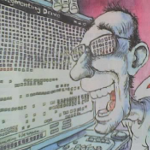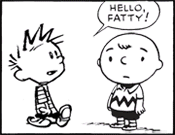|
now watch this drive
|
|
|
|

|
| # ? May 5, 2024 13:24 |
|
Boy and we all thought Bush would go down in history as the dumbest president. Great thread. 2001 is when I first got an account in SA at the ripe age of 15. Can't believe it's been so long. Looking forward to passively relive the horrors that would eventually consume us all
|
|
|
|
Nuebot posted:What did Stewart do? I've been out of the loop since he stopped hosting his show, and even then wasn't that aware of him outside of the show. The scales started to fall from my eyes when he hosted his rally to restore sanity, the message of which was "There's crazy people on both sides, we need compromise and bipartisanship." When people were finally waking up to the fact that wealth inequality was kinda hosed up and reaching emergency levels, he told his followers to just calm down. Soon after the way he treated his employees came to light. He was incredibly antagonistic toward his writers, to the point of chasing some of them away from the job, and during the writers' strike instead of respecting his writers he returned to the air anyway - and when Seth MacFarlane had the temerity to make a throwaway joke about it, Stewart blasted MacFarlane in an hour-long telephone call. He played at being a pro-union guy on air, but behind the scenes was very anti-union and punished his writers for unionizing. There's some other stuff related to some racist humour (not the stuff cited by Wyatt Cenac above) but I can't find the links to back them up anymore, so...  This is all kind of semi-related to the thread's topic at best, but in the early oughts and during the early parts of the Iraq War TDS was the only television media I consumed on a regular basis, so the disappointment hit me pretty hard around 2010.
|
|
|
|
So far this is a very good thread and I am also very glad this post made it to the first page. It's a shame that guy died after he bled out getting his dick caught in a vacuum cleaner.yellowcar posted:How long will it take to capture Baghdad? 2 days
|
|
|
|
Its good to know that all these republican candidates for president in 2000 are in agreement that we need to end the influence of special interests and "Big HMO" money on congress. I bet if we elect a republican they'll solve that problem right up
|
|
|
|
Nuebot posted:What did Stewart do? I've been out of the loop since he stopped hosting his show, and even then wasn't that aware of him outside of the show. everyone's gone over the well known stuff but there was also this https://twitter.com/adamjohnsonNYC/status/865055182652100608 just typical lib poo poo
|
|
|
|
Do not even ask posted:everyone's gone over the well known stuff but there was also this Woof! That’s a new one. Just finished watching of the Republican debate. It was long, boring, and deeply psychotic. I’ll have more thoughts up about it in a bit
|
|
|
|
Falstaff posted:Dude! Spoilers! Gonna drop this nuclear take without any sort of follow-up explanation?
|
|
|
readingatwork posted:The main points of criticism are that his theory of political change sucks (See: The Rally to Restore Sanity which I will cover in detail when it comes up in like a million weeks) and also that he was staunchly anti-union and kind of a dick about it. I'll still defend him on a lot of fronts but on these points his critics are 100% correct. Falstaff posted:This is all kind of semi-related to the thread's topic at best, but in the early oughts and during the early parts of the Iraq War TDS was the only television media I consumed on a regular basis, so the disappointment hit me pretty hard around 2010. Do not even ask posted:just typical lib poo poo Ouch, I knew about the Rally but only tangentially I never really looked into it, and the rest of the stuff was new to me. I'll have to keep an eye on this topic, seems like it'll be eye opening since I only moved to america during the middle bush years and still hadn't really become politically aware of anything, and was struggling to just figure out how to live here. I didn't start watching The Daily Show until the end of the Bush era and sweeping into Obama where the guy was mostly talking about his attempt to get aid for the 9/11 responders so that explains why I had no real idea of a lot of this.
|
|
|
|
|
It's really hard to overstate how confused leftists like myself were about the Rally to Restore Sanity. This was in the wake of Occupy Wall Street, which was basically babby's first class consciousness after decades of being effectively asleep, and despite being just about the most harmless protest you could imagine it was being suppressed and dismantled by the powers-that-be, sometimes pretty brutally. Then Stewart and Colbert get up on the stage with 100,000 people and tell everyone, "Actually, you need to calm down. Be nicer to the people stomping their boot in your face and maybe we can get back to normal." I don't think anyone was expecting that. Again, sorry for the tangent.
|
|
|
|
Jon Stewart also defended CHUDs, or at least Trump voters, as merely concerned about the well-being of their communities, not actively bad people. I knew then, as I know now, that opinion was garbage, and boy howdy has it aged badly!
|
|
|
|
It first became clear that Stewart was poo poo in 2004 during his slapfight with Tucker Carlson. I mean yeah it's always good to dunk on a fash like Carlson, but Stewart also revealed how utterly irresponsible he was as a political influencer. He still denies that his show had any impact on politics. Politics, to him, is just a thing to make jokes about. He doesn't give a poo poo about it beyond that.
|
|
|
|
|
ANIME AKBAR posted:I mean yeah it's always good to dunk on a fash like Carlson, but Stewart also revealed how utterly irresponsible he was as a political influencer. He still denies that his show had any impact on politics. How can he deny his show had an impact on politics when every single late night talk show on air outside of Fallon is heavily modeled after his TDS days
|
|
|
|
OK, so here are my thoughts about the Jan 15, 2000 Republican primary. First off, gently caress these people. Look at this lineup of demonic pedophile (allegedly) freaks:  George W Bush Governor of Texas The man himself. Had this expression the whole loving time.  Gary Bauer Former president of the Family Research Council and Reagan's chief policy advisor Has the incredible ability to look at that weird face in the mirror every morning and not kill himself.  Steve Forbes The guy Forbes magazine is named after. Has incredible Jeb(!) energy  Orrin Hatch Senator from Utah from about 350BC to 2019 Is completely dead inside  Alan Keyes Ambassador under Reagan and also an AM radio host or something Legit psychopath  John McCain Senator from Arizona Was captured, so certain people don't like him LOOK AT THEM! Second, this was 30 mins longer than the Dem debate and twice as boring. gently caress these people and gently caress America for producing this poo poo. Here are the observations I made (again, loosely in the order that I had them) while watching. Sorry there are so many but it WAS significantly longer than the Democratic one:
So yeah, that was a weird combination of insanely boring and just plain insane. About 60% of it was dedicated to various tax plans that were all thinly veiled schemes to give money to the rich and the rest was culture war nonsense mixed with legitimately terrifying discussions on the best ways to disband the IRS. One thing I will say is that I believe that these people (except for Keyes and Bauer and maybe Forbes) are actually serious about governing. I mean that in the sense that I think characters like Hatch and McCain see their jobs as politicians as more than *just* a way to grift people on behalf of the wealthy. There's definitely a different texture to this debate compared to 2020, even is a lot of the crazy is still there. The biggest surprise to me was just how crazy Keyes was. He started off pretty banal but towards the end he pulled out the stops and was overtly calling for America to have a spiritual awakening and return to it's religious roots. Apparently he's pushing bleach as a miracle cure for Covid-19 these days and trying to sell Trump on the idea. I wish I were kidding. Bush did fairly well all things considered. He's clearly an idiot and sounds scripted as hell but he had the good sense to say the right things when put on the spot. He has a sort of disarming goofy affect that makes him seem harmless. This is both probably why he won in the and and why so many people found it so hard to believe that he was incredibly evil. As much as I hate the trope he really is the candidate you feel like you can sit down and have a beer with. It's a shame he became president and not just some lovely baseball manager like he wanted because he'd probably be somewhat likeable if kept far away from the levers of power. Winner: Bush readingatwork fucked around with this message at 03:43 on May 9, 2020 |
|
|
|
Falstaff posted:It's really hard to overstate how confused leftists like myself were about the Rally to Restore Sanity. This was in the wake of Occupy Wall Street, which was basically babby's first class consciousness after decades of being effectively asleep, and despite being just about the most harmless protest you could imagine it was being suppressed and dismantled by the powers-that-be, sometimes pretty brutally. Then Stewart and Colbert get up on the stage with 100,000 people and tell everyone, "Actually, you need to calm down. Be nicer to the people stomping their boot in your face and maybe we can get back to normal." Stewart fundamentally believed that the rot in America was due to stupidity and people not listening to each other. Unfortunately for him it was actually caused by capitalism and the deep corruption of everybody in charge. But let's hold off on Stewart talk until the actions in question actually come up. Trust me. We'll get there. In the meantime enjoy more Jan 2000 TDS http://www.cc.com/video-clips/7oacvx/the-daily-show-with-jon-stewart-ad-nauseam---political-ads
|
|
|
|
ANIME AKBAR posted:It first became clear that Stewart was poo poo in 2004 during his slapfight with Tucker Carlson. I mean yeah it's always good to dunk on a fash like Carlson, but Stewart also revealed how utterly irresponsible he was as a political influencer. He still denies that his show had any impact on politics. Politics, to him, is just a thing to make jokes about. He doesn't give a poo poo about it beyond that. I mean, that was the attitude of the time he came up. A lot of people were unhappy in the 90's and 2000's but it was very cynical. Politics was something to be mocked and gawked at but very few people were as angry as they are now. And a lot of it was just an attitude of these things being uncool.
|
|
|
|
Tommah posted:now watch this drive honestly this thread should just be this quote
|
|
|
|
Another fun fact about this time: The stonks were doing amazing and were certainly not overvalued: https://www.nytimes.com/2000/01/08/business/the-markets-stocks-the-3-main-us-stock-gauges-rally-to-end-a-turbulent-week.html New York Times posted:Jan 8, 2000: STOCKS; The 3 Main U.S. Stock Gauges Rally to End a Turbulent Week This will be relevant soon. Also let's look at the state of gay rights at the time: Jan 7 - Officers Riled by Policy on Gays Proposed in Gore-Bradley Debate The New York Times posted:When Clinton administration officials interviewed Gen. Charles C. Krulak for the job of commandant of the Marine Corps in 1995, he recalled today, no one asked for his views on any social issue facing the military. And there were certainly many brewing at the time, including women in combat and the integration of the sexes in boot camp. Jan 15 - Supreme Court To Review Ban On Gay Scout The New York Times posted:The Supreme Court agreed today to decide, in a closely watched case from New Jersey, whether the Boy Scouts have a constitutional right to exclude gay youths and adults from positions of leadership. Jan 21st - THE 2000 CAMPAIGN: THE VICE PRESIDENT; Gore Meets With Gay Leaders Before Homestretch in Iowa The New York Times posted:Vice President Al Gore opened his final four-day push for the Iowa vote at a rally here today by countering Bill Bradley's efforts to cast him as the candidate of entrenched power, but he began his day with a private meeting with 20 gay leaders at his residence in Washington. Finally: Oh poo poo you guys, remember Ellian Gonzallez!? New York Times Opinion posted:A Decision on Elian Gonzalez Thinking about moving on to Feb 2000 tomorrow unless there’s more about this month people want to discuss. I can keep posting stuff from Jan but it will be more stuff about the day-to-day news at the time readingatwork fucked around with this message at 23:59 on May 9, 2020 |
|
|
|

|
|
|
|
I can't recall if this fell out of favor by the 2000s, but you know what dogshit term I remembered the other day? "Alternative lifestyles" as a way to refer to LGBT people
|
|
|
|
I was 21 on January 1st, 2000, and turned 30 a few months before Obama's inauguration. The Bush years encompass my entire 20's (and they were lovely), I'm super excited for this thread. Code Jockey posted:I can't recall if this fell out of favor by the 2000s, but you know what dogshit term I remembered the other day? It was still in use in the early 2000s and if I remember correctly was considered the politically correct term at the time. This is not surprising considering this is the time the term "African-American" came out as the politically correct way to refer to all black people everywhere.
|
|
|
|
oh my god the iraq war was my political awakening the concept for this thread owns
|
|
|
|
I turned 18 just after 9/11 and I remember all the batshit insane gymnastics the Bush presidency did to go to war in Afghanistan AND Iraq at nearly the same time, whilst military recruiters went hard core on getting people to sign up. I actually fell for it and enlisted as part of a “Delayed Entry Program” that would allow me to complete two years of college and enter the military at a higher rank. Was supposed to have my college paid for up front (it wasn’t) and eventually I ended up leaving the program due to health issues.
|
|
|
|
 We are now in February of 2000 We are now in February of 2000 That said I won’t be too mad if you post anything jucy I missed from January. OK, so this is an even slower month than January. The primaries for both parties were continuing with Gore winning New Hampshire, Delaware and Washington. Meanwhile on the Republican side of things were more complicated. Here’s the breakdown: Bush: Delaware South Carolina Puerto Rico Virginia Washington North Dakota McCain: New Hampshire Arizona Michigan It looks like McCain was hoping to leverage New Hampshire into a larger set of wins but that just didn’t pan out in the end: Feb 1, 2000 - THE 2000 CAMPAIGN: THE MAVERICK; Fate of McCain Campaign Rests on Today's Vote The New York Times posted:By Alison Mitchell So fun fact. We actually had a budget surplus at this time because we weren’t in twelve wars at once and still actually made rich people pay ~some~ taxes. In fact, while there were still conflicts in various other countries (Russia was invading Chechnia or something at the time. I’ll research it more later) the US itself was pretty hands off for the first time in ages. Talks of a “peace dividend” abounded and everybody was salivating at the opportunity to use all this new cash for various pet projects,strengthening Social Security being one of the most popular options. Sadly, for obvious reasons this would not last. Anyways, here’s an interesting piece on how voters felt about the election at the time: Feb 1, 2000 - THE 2000 CAMPAIGN: THE VOTERS; Contented Electorate Is Also Happy With Campaign The New York Times posted:By Richard L. Berke and Adam Nagourney Here’s audio of Noam Chompsky talking about Gobalization, which was still relatively new at the time: https://www.democracynow.org/2000/2/3/noam_chomsky_globalization_the_new_face And here’s a Democracy now piece on money in politics and the election. https://www.democracynow.org/2000/2/3/candidates_trail_of_money (Democracy Now has it’s whole archives up for free and that makes me very happy.) I want to keep these posts manageable so I'll stop here for now. While I prepare more stuff have a mildly problematic TDS clip where a comfortable white guy pokes fun at cultures he doesn’t understand: http://www.cc.com/video-clips/atqs6l/the-daily-show-with-jon-stewart-back-in-black---february More stuff will be posted as the week goes on. As always feel free to post your own news stories or even just neat cultural artifacts of the time.
|
|
|
|
readingatwork posted:I want to keep these posts manageable so I'll stop here for now. While I prepare more stuff have a mildly problematic TDS clip where a comfortable white guy pokes fun at cultures he doesn’t understand: lmao this is the kind of poo poo people would use as proof of Trump's white supremacy if he said it*. * and they wouldn't be wrong, but most liberals over the age of like ~40 still feel this same way Falstaff posted:It's really hard to overstate how confused leftists like myself were about the Rally to Restore Sanity. This was in the wake of Occupy Wall Street, which was basically babby's first class consciousness after decades of being effectively asleep, and despite being just about the most harmless protest you could imagine it was being suppressed and dismantled by the powers-that-be, sometimes pretty brutally. Then Stewart and Colbert get up on the stage with 100,000 people and tell everyone, "Actually, you need to calm down. Be nicer to the people stomping their boot in your face and maybe we can get back to normal." In hindsight I think that may have been one of the key moments that caused me to stop being a liberal. It might be the earliest time I can think of where I genuinely felt like whatever these liberals believed was deeply different from my own views. Another was the media response (particularly in places like NPR) to Occupy Wallstreet and seeing how quickly and successfully they silenced all references to it after the major camps were shut down. ANIME AKBAR posted:It first became clear that Stewart was poo poo in 2004 during his slapfight with Tucker Carlson. I mean yeah it's always good to dunk on a fash like Carlson, but Stewart also revealed how utterly irresponsible he was as a political influencer. He still denies that his show had any impact on politics. Politics, to him, is just a thing to make jokes about. He doesn't give a poo poo about it beyond that. I embarrassingly remember thinking that Stewart came off good in that exchange at the time it happened. IIRC the video was linked a lot as an example of a conservative being owned. Ytlaya fucked around with this message at 19:08 on May 10, 2020 |
|
|
|
the discourse changes a lot in twenty years, and a startling amount of stuff has happened since then - for example, the extreme tabooisation of the n-word wasn't even there yet - chris rock in particular has whole routines where he riffs on white people's discomfort with it, and while chris rock is not an intellectual, as mega-popular comedian at the time he's a pretty good indicator of where the mainstream discourse is
|
|
|
|
stewart vs carlson is not a discussion about left vs right, it's stewart bemoaning that the level of discourse on a flagship political show is entirely comparable to that of a news-based comedy show and quite often lower. he's unable to articulate it beyond jokes because he is, after all, a comedian first and foremost (unlike e.g. john oliver today who clearly tries to use his show as a comedy-tinged news vehicle) and he's 100% a nineties left-liberal basically stewart is assuming that politics is and ought to be a rational discussion of principles that he, a comedian, can turn into comedy, but that it really shouldn't be comical in itself. all political history since then has served to prove him wrong, but that is a very fundamental part of the liberalism that stewart represents
|
|
|
|
LMAO holy poo poo you guys I didn't realize that the first version of Biden's infamous bankruptcy bill passed the senate this month. Not THE one people keep talking about mind you. That one happened in 2005. This was a first, but ultimately unsuccessful attempt that would later be tried again in 2001 (it failed that time as well). Feb 3 - SENATE APPROVES A BILL TO TOUGHEN BANKRUPTCY RULES The New York Times posted:By Eric Schmitt Oh right. Hillary was running for the Senate at this point as well Feb 10 - A user's guide to New York Senate race CNN posted:By Frank Buckley
|
|
|
|
readingatwork posted:Anyways, here’s an interesting piece on how voters felt about the election at the time: This type of thing was why I was quite surprised when Bush won. For many Americans, the 90s was a time of massive prosperity and few worries; why would you switch away from what seemed to be working? pthighs fucked around with this message at 22:15 on May 10, 2020 |
|
|
|
V. Illych L. posted:oh my god the iraq war was my political awakening the concept for this thread owns 
|
|
|
|
pthighs posted:This type of thing was why I was quite surprised when Bush won. For many Americans, the 90s was a time of massive prosperity and few worries; why would you switch away from what seemed to be working? Because both sides deserve a chance or some bullshit. Also Gore sighed during a debate and old people in Florida should never be allowed to do anything, much less vote
|
|
|
|
Ytlaya posted:Another was the media response (particularly in places like NPR) to Occupy Wallstreet and seeing how quickly and successfully they silenced all references to it after the major camps were shut down. I remember this, too... Very vividly. I'm going to hold off commenting on it until we get closer to it in the timeline, though. Maybe as part of a coda after we're done with the Bush years, if readingatwork wants to stop there. pthighs posted:This type of thing was why I was quite surprised when Bush won. For many Americans, the 90s was a time of massive prosperity and few worries; why would you switch away from what seemed to be working? tigersklaw posted:Because both sides deserve a chance or some bullshit. Also Gore sighed during a debate and old people in Florida should never be allowed to do anything, much less vote Don't fool yourselves - there was a powerful undercurrent of discontent during the Clinton years due to the Dems' continued slide rightward. It was just largely invisible because the media kept it invisible, and the internet was in its infancy (and not accessible by most people outside of $3-5/hour "internet cafes") so that avenue for communication wasn't really feasible. There's a reason the 90's saw such incredibly successful third party runs, and why everyone and their dog laughed about how the two main parties had almost no daylight between them. The Clinton years were only successful for a very particular set of demographics. Looked great on paper, though. Falstaff fucked around with this message at 23:26 on May 10, 2020 |
|
|
|
pthighs posted:This type of thing was why I was quite surprised when Bush won. For many Americans, the 90s was a time of massive prosperity and few worries; why would you switch away from what seemed to be working? they also literally stole the election for bush by what amounts to a judicial coup, one of the most outrageous maneuvers in the history of american presidential politics
|
|
|
|
pthighs posted:This type of thing was why I was quite surprised when Bush won. For many Americans, the 90s was a time of massive prosperity and few worries; why would you switch away from what seemed to be working? There are a few reasons Gore lost I think. First off, Gore was an incredibly awkward communicator. He had an in incredibly nervous nerd energy to him that could be alienating to the casual viewer. He’s the guy that got A’s in school and reminded the teacher when she forgot to assign homework, not the kind of person you could get shitfaced with after work. Bush, on the other hand, absolutely WAS that guy. Literally. He was a party animal in college and actually struggled with alcoholism, an experience far more normal people could relate to. I don’t think that explains everything tough. The reality is that there actually WAS a decent amount of dissatisfaction with life in the 90s in certain circled (circles often ignored by newspapers like NYT). Capitalism was still very much a thing and even those who were successful had to dedicate most of their life to a job that they hated and a boss that exploited them. Not only that but in certain respects life actually got worse for people over the decades. Yes, people were technically making more but their paychecks didn’t go as far as they once did. People who’s parents supported a family on one income soon found themselves going into debt to provide that same lifestyle with two. Factories were threatening to close and move overseas while illegal immigration was (theoretically) on the rise and threatening what little stability you still had. And while you were dealing with this those drat lefties were adding even more stress by telling you that your religion was bad or that you can’t make jokes about the gays anymore. This could have fueled a shift leftward but the internet wasn’t a thing yet, and as we’re seeing the liberal left wasn’t willing to discuss any sort of systemic change. As a result the right found itself able to channel much of that frustration through things like AM radio into right wing social fights like abortion and illegal immigration. Liberals offered dry facts and being 30% better than the Republicans, but Republicans offered you a righteous cause and the blood of your enemies which was incredibly tempting if you were already angry and didn’t understand why. So yeah, Gore lost because the people who were content with life weren’t really invested in politics and those that had a bone to pick with the neoliberal world order really had nowhere to go to express their anger but the Republicans. Even so Gore still would have won if not for a particularly SCOTUS ruling, but we can discuss that part when we get to it. E: Damnit, beaten. readingatwork fucked around with this message at 23:52 on May 10, 2020 |
|
|
|
the 2000 election was the end of history election, and gore the ultimate end of history liberal candidate - smart, technocratic, completely dogmatic, unambitious policy-wise and *boring*. he went public with a work of the philosophy of science as being his favourite book, a book vanishingly few people have even heard of, much less read, while bush went with probably the all-time most read book which is monumentally more influential culturally. america decided that history wasn't over.
|
|
|
|
I was ten years old in 2000, so the Bush years were my entire teenage life. I thought I had a handle on what made Bush so awful abck then, but since ive been blindsided by so many things he did that I only learned about alter. excited to see how much worse he was with this thread.readingatwork posted:Jan 4: The Daily Show with John Stewart was incredibly important at the time so expect me to talk about it a lot. Here’s what it looked like at the beginning of the millennium. there's a lot to unpack from early Daily Show clips, but Jon Stewart calling Seattle "pussies" for worrying about terrorism in the 21st century sure hits different,
|
|
|
|
As someone who became an adult after Bush was gone, I'm curious as to how Democrats justified going to war in Iraq?
|
|
|
|
A post in another thread reminded me that Bill Maher was a thing at this point and probably worth following since he will later get booted from his show for political reasons. https://youtu.be/onyFxcQFA70
|
|
|
|
ToxicAcne posted:As someone who became an adult after Bush was gone, I'm curious as to how Democrats justified going to war in Iraq? The country was still in post 9/11 fear mode and the administration made the case that Saddam Hussein had chemical and biological weapons. He didn’t but there were quite a few trusted administration officials who were making the case complete with “evidence” (see, vials of anthrax).
|
|
|
|

|
| # ? May 5, 2024 13:24 |
|
ToxicAcne posted:As someone who became an adult after Bush was gone, I'm curious as to how Democrats justified going to war in Iraq? An argument I remember hearing at the time was, well, whatever the case may be with weapons of mass destruction, the fact is that Saddam is a bad person and everyone will be much happier when he's gone.
|
|
|


































